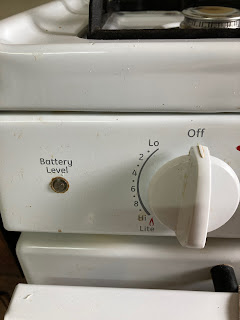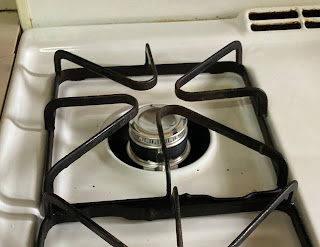(from Eric)
Back in 2012, when we were packing up our first container to ship to Burundi for our team, we though it would be good to invest in some high quality appliances, not knowing what would be available in country. We found a vendor that sold 220v/50hz appliances for overseas military families, and bought fridges, microwaves, and washing machines. We also bought stoves, mostly gas (knowing that electricity could often be out), but some electric (knowing gas tanks could be hard to find sometimes).
We're still using those appliances. The fridge...well, the fridge would be a whole other story. But I was reflecting on the story of the stove this morning and I thought I'd share the saga, both as a glimpse of daily Burundian life as well as a microcosm for our life work here.
Part the First: Insulation and Open Flames
One of the first problems with the stove had to do with the drawer that opens beneath the oven. Since it is a gas stove, this is the broiler (not an extra storage space like the electric ovens I grew up with). One of the bolts was too tight or warped or something. This made it hard to open, and the extra force required to open it, over time, loosened other bolts. These loosened bolts ripped the door in half, exposing sheets of yellow insulation. Maybe that's not that big of deal next to a big open burner, but it made me uncomfortable. We tried a lot of little fixes without success.
One day, pondering the broken apparatus, I realized that a couple of well-placed bolts directly through the metal casing could solve the problem. Only I didn't know how to drill through metal. I tried it out with a metal bit from the team workshop, but with no success. I went and found Jason. He showed me the right drill bits to use, and generally pointed me in the right direction. The resulting fix (see yellow arrow below for the externally visible part) has been durable for several years now, and our pizzas are the better for it.
Lesson the First: Things fall apart, and there aren't a lot of professionals to call. This means that we are called to stretch ourselves, and do new things. Thankfully our teammates have a diversity of talents and can help guide us. And sometimes, it works out really well.
Part the Second: Electric Ignitions and Omar the Canadian Muslim Missionary
Around the same time as the above story, our electric ignition stopped working. The little "battery level" light stopped working, and a new battery didn't solve it. I pulled the stove out from the wall, took off the back, and traced the wiring through the whole stove. It all seemed to point to a box in the back. I wasn't sure what to do.
At that time, our team had encountered Omar. Omar grew up in an ethnically Indian community in Zambia, then moved to Canada. He became a very talented A/C repairman and then studied Islamic theology in England prior to moving to Burundi to work with the Islamic community in Bujumbura. He maintained a job repairing air-conditioners (and other appliances) to support his family. He came up to Kibuye to repair some things, and we had become friends. In fact, during the heart of the Covid pandemic, his family moved up to nearby Gitega in order to have Rachel deliver their baby. To say thanks to the team, they had a big Halal feast of some really awesome grilled meat.
We asked Omar to take a look at the electric ignition. His diagnosis: no easy way to repair that here in Burundi. So we use matches to light the stove. No big deal. Lighting the oven below is a different story, with many episodes of dropping my match as the flames come rushing towards my face. Rachel's a lot better at lighting the oven than me, so that's her job if she's around.
Lesson the Second: We get creative in our attempts to fix things. We examine all the possibilities, and sometimes it's still broken. That's just how it is for now. It's not great, but we limp on.
Part the Third: New Burners of Unknown Provenance
While Omar was checking out our stove, he looked at the burners. He expressed his concern at their corrosion and build-up. We said that we had also noted them burning a bit akimbo sometimes. What do we do? Omar said they needed to replaced, and that he could order them from a guy he knew. Okay.
We left for the US for several months in 2021. We came back and heard that Omar and his family had returned to Toronto. We were sad to not get to say good-bye. We completely forgot about the burners. Most of them worked pretty well. Good enough (see Part the Second).
Yesterday, I came home and found brand new shiny burners in our stove! They burn like the brand new stove that they are. Rachel, what happened!? It seems that, after over 2 years, Omar's friend came through with his order, and they were sent to Kibuye with some other stuff, already paid for, apparently.
Lesson the Third: Sometimes broken things stay that way for a long time, despite all our efforts. We might even forget about the possibility of improvement. Then, all of a sudden, after years of dormancy, an unexpected solution comes about, reminding us that the world around us is a swirling sea of everyday grace.





No comments:
Post a Comment